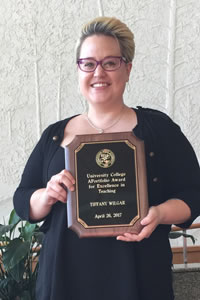Tiffany Wilgar 2017 Aportfolio Award for Excellence in Teaching

Tiffany Wilgar from the Rhetoric and Composition program was selected as the recipient for the 2017 award. She holds a M.A. in English from University of Nevada and is ABD for her Ph.D in Rhetoric and Composition from the University of South Florida. She began teaching at Appalachian State University in fall 2016.
Tiffany successfully supports and engages her students in leveraging Aportfolios in her classes using multiple methods.
Here is her perspective:
The APortfolio assignment in my classes functions as a capstone opportunity for students to display, demonstrate, and practice the primary learning goals of the course. My courses center on rhetorical awareness and teaching students how to make choices thoughtfully and purposefully as a creator of texts. My APortfolio assignment expects students to display their best work and reflect on their achievement of the course goals and outcomes. These requirements are intentionally broad to create the space for students to make rhetorical choices regarding content, organization, and design. My students engage with rhetorical theory as both receivers and producers of texts, and APortfolio is a culmination of their instruction in rhetoric. Generating an APortfolio requires students to consider and employ audience awareness, strategies of argument, usability, visual rhetoric, and basic design principles.
Emphasizing digital literacy in writing classrooms is of increasing importance as communication continues to shift toward digital media. My students are using Wordpress for  weekly blogging, word processors for formal writing assignments, and video editing software (e.g., iMovie or Windows Movie Maker) to create video essays. A secondary goal of my writing classes is to lead students through the experience of using writing/composing technology previously unfamiliar to them. Although my students may not continue to use the specific platforms from my class, the skill of learning to navigate new technology transfers beyond the classroom. APortfolio provides students another avenue for learning how to use digital media rhetorically. My students also learn to synthesize digital writing platforms through figuring out how to best integrate their blogs and video essays into their web-based final portfolio.
weekly blogging, word processors for formal writing assignments, and video editing software (e.g., iMovie or Windows Movie Maker) to create video essays. A secondary goal of my writing classes is to lead students through the experience of using writing/composing technology previously unfamiliar to them. Although my students may not continue to use the specific platforms from my class, the skill of learning to navigate new technology transfers beyond the classroom. APortfolio provides students another avenue for learning how to use digital media rhetorically. My students also learn to synthesize digital writing platforms through figuring out how to best integrate their blogs and video essays into their web-based final portfolio.
Tiffany also shares her use of Aportfolio for Assessment in her courses:
APortfolio assessment in my classes compliments traditional instructor evaluation by providing a real-world forum to demonstrate their ability to make rhetorical choices as authors. APortfolio also functions as a space for students to reflect and self-evaluate. Throughout the semester, I provide assessment and evaluation on student work which is, for the most part, a one-way flow of communication. In APortfolio, my students reflect on their work in relation to the course goals and outcomes which provides students a new perspective on their own achievement.
In my classes, excellent APortfolios demonstrate student learning and achievement through effective design choices, competent organizational skills, and thoughtful reflective writing that connects their growth to the goals and outcomes for the course.